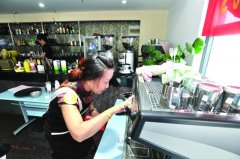The "Korean Wave" of coffee consumption market is surging.
With the growth of young and fashionable people and the substantial growth of returnees and overseas travelers, coffee culture has developed rapidly in China, and cafes have become a popular place for modern urbanites to gather and relax. Statistics show that coffee consumption in China is growing at an annual rate of 10% to 15%, and the number of cafes has doubled in the past five years. The annual per capita consumption of coffee in Japan and South Korea has reached more than 300 cups, while that in China is less than 5 cups. The huge market space has fascinated the coffee industry practitioners.
Recently, the three-day 2014 China International Coffee Exhibition ended at the Sanyuanqiao China International Exhibition Center in Beijing. The exhibition is jointly sponsored by China Exhibition Group Beijing Huagang Exhibition Co., Ltd. and South Korea's EXPORUM Company. It is understood that the exhibition area of this coffee exhibition has nearly doubled compared with the previous one, with an audience of 45872.
China's huge consumer market has attracted more than 120 enterprises from 15 countries and regions to participate in the exhibition, basically covering the whole industry chain, such as coffee bean import, coffee roasting, chain joining, training and so on. at the same time, it also includes tea, beverages, baked desserts and ice cream and other coffee shop surrounding products. "China's demand for coffee beans is on the rise, and we want to bring high-quality coffee beans to Chinese consumers." An American exhibitor told the International Business Daily that his main business is to sell coffee beans purchased from Central and South America to China. According to his observation, many Chinese consumers are not very interested in black coffee and prefer coffee drinks with dairy products such as lattes and mochas, but the number of Chinese consumers interested in boutique coffee beans is also slowly increasing. "fresh boutique coffee beans are not as expensive as people think. In fact, the coffee sold by chain stores is quite expensive, and the quality of beans is not high. "
The reporter saw at the exhibition site that the Korean pavilion was very powerful and crowded, among which the flexible investment mode of coffee with you attracted a lot of visitors to consult. A staff member of the booth told reporters that at present, there are more than 500 stores that accompany you in China, including more than 60 direct stores. The reporter noticed that the newly launched poster of Coffee accompanies you with the slogan "entrusted joint venture operation mode, two years' investment recovery"500000 owns coffee shop, 178000 owns self-service coffee bar", and the spokesman has also been replaced by South Korean artist Kim Soo-Hyun, who is very popular in China.
In addition to coffee accompany you, Oreba and other chain brands, juice drinks, coffee training schools and other coffee-related booths have also attracted the attention of many visitors.
South Korean food and beverage company Xiangxia Filib just entered the Chinese market this year and set up a branch in Shanghai. Lin Tinghe, the person in charge of the booth, said in an interview with our reporter that Xiangxia Fountain B not only produces high-quality concentrated fruit juices and puree, but also manufactures food machinery such as juicers and ice planers, which mainly serves large catering enterprises in South Korea, such as Starbucks, Coffee, Paris, Burger King, etc. "like other exhibitors, we are very optimistic about the prospects of the Chinese market and hope to provide products and services for Chinese coffee and catering enterprises."
DSBEAN is a coffee training institution run by Korea Chongshi University and Tianjin Foreign Studies University. It provides professional education and training for coffee lovers and those who are eager to pursue a career as a barista or coffee trainer. Through study and examination, students can obtain certificates such as coffee trainer certificate issued by the president of Chongshi University in Korea and European Fine Coffee Association qualification certificate. Booth staff told reporters that the training institution is located in Tianjin Foreign Studies University and is expected to start in October this year.
In the face of the heroic momentum of South Korean exhibitors, Dou Shu, founder of Beijing Dou Shu Coffee Roasters, said that although the "Korean Wave" is unstoppable, there is no need to avoid it. Because the maturity of the coffee consumption market in South Korea is indeed much higher than that in China, "there are so many cafes on the streets of Seoul, it can be described as' three steps, one post, five steps and one whistle." South Korea's domestic market has become saturated, so their enterprises must open up the market. The government also encourages enterprises to'go out'. "
According to Uncle Dou, China's coffee industry has developed rapidly in the past 10 years, especially in first-and second-tier cities, where the number of stores, practitioners and coffee retailers are on the rise. "the number of visitors to the International Coffee Show is also increasing, and the audience's level of appreciation and professionalism are improving." Uncle Dou said that China's coffee consumption market has great potential, but at present, the real coffee lovers are still in the minority. After all, China is a big tea-drinking country.
Important Notice :
前街咖啡 FrontStreet Coffee has moved to new addredd:
FrontStreet Coffee Address: 315,Donghua East Road,GuangZhou
Tel:020 38364473
- Prev

Making a good cup of coffee is not just how baristas make it.
The coffee pot boils ups and downs, the coffee cup contains dreams, and the coffee shop is filled with fragrance. Nowadays, more and more people drink coffee. For them, coffee is not only a drink, but also a fashion label.
- Next

A cat cafe opens in Canada and lazy cats soothe people.
The picture shows the first cat cafe in Canada. Chinanews.com, Sept. 1-according to foreign media reports on the 1st, a new coffee shop opened in Montreal, Canada, a few days ago, which is no different from a general cafe, except that it has eight cats, which come from animal shelters and are free to interact with guests. In addition to tables and chairs for guests in the Cat Cafe (The Cafe des Chats)
Related
- What brand of black coffee is the most authentic and delicious? what are the characteristics of the flavor of the authentic Rose Summer Black Coffee?
- Introduction to the principle and characteristics of the correct use of mocha pot A detailed course of mocha pot brewing coffee is described in five steps.
- Which is better, decaf or regular coffee? how is decaf made?
- How much is a bag of four cat coffee?
- How about four Cat Coffee or Nestle Coffee? why is it a cheap scam?
- Which is better, Yunnan four Cats Coffee or Nestle Coffee? How about cat coffee? is it a fake scam? why is it so cheap?
- How about Cat Coffee? what grade is a hoax? which instant coffee tastes better, four Cat Coffee, Nestle Coffee or G7 coffee?
- Process flow chart of coffee making-Starbucks coffee making process what coffee tastes good at Starbucks
- The top ten best coffee beans in the world Rose summer coffee or Tanzanian coffee tastes good
- Yunnan four cat coffee is good to drink?_four cat coffee is a big brand? four cat blue mountain coffee is fake?

